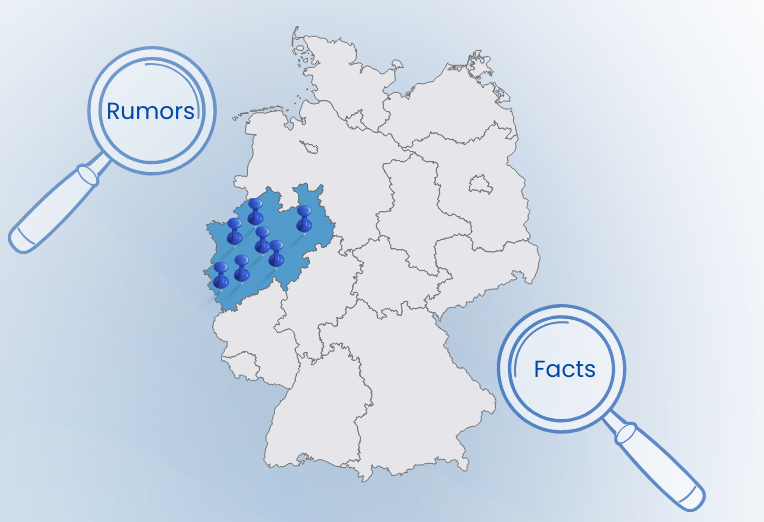Rumor vs. Reality: Understanding the Information Gap
By Leslie Weiler
In late August / early September 2025, several deaths of AfD (Alternative for Germany) candidates in the German state of North Rhine‑Westphalia (NRW) have stirred speculation. Seven individuals associated with the party, including primary and reserve candidates, died in fairly quick succession before a local election scheduled for September 14th.
The events have prompted rumors: Were these deaths purely coincidental? Or might there be something more to them? Here are the arguments on each side, along with what seems confirmed vs what remains uncertain.
What is Known
- Seven AfD candidates (including primary and reserve/list candidates) died before the NRW local elections.
- The individuals include:
• Stefan Berendes (Bad Lippspringe), Wolfgang Klinger (Schwerte), Wolfgang Seitz (Rheinberg), Ralph Lange (Blomberg) — primary candidates.
• René Herford, Patrick Tietze — reserve candidates.
• In some reports, a seventh candidate, Hans‑Joachim Kind, is mentioned as having died after a long illness. - Reported causes of death include natural causes, illness, kidney failure, and suicide. In at least one case, a pre‑existing medical condition is cited.
- Authorities (police, interior ministry, etc.) have publicly stated that there is no evidence so far of foul play or third‑party involvement.
- In some of the cases, investigations were conducted or at least preliminary inquiries, and nothing suspicious was found.
- The deaths have had practical effects: for instance, reprinting ballots, invalidation of postal votes, or technical/administrative complications in the election process.
Arguments Raising Suspicion ("Might there be something more?")
- Clustering/Timing
The number of deaths in a relatively short period, all linked to the same party, and during an election campaign, strikes many as unusual. The temporal proximity is seen by some as more than random coincidence. - “Statistically Almost Impossible”
Noted public figures (e.g., economist Stefan Homburg) and some AfD leaders have described the set of deaths as being “statistically almost impossible” to be purely coincidental. - Lack of full disclosure
Because some causes of death are only partially known (or not made public for privacy reasons), there is space for speculation. When causes are undisclosed, people may suspect information is being withheld in order to conceal something. - Amplification via social media
The rapid spread of the suspicion online, plus statements by prominent persons, reinforce public perception that something might be going on. Rumors and conspiracy theories, once seeded, grow quickly.
Arguments Supporting Coincidence
- Authorities’ Statements
Police and government bodies in NRW have explicitly said that they see no evidence of criminal involvement. - Multiple and Varied Causes of Death
Some of the deaths are linked to known medical conditions, or are suicide or natural causes. They are not all of a single type, which reduces the plausibility of a single orchestrated cause. - Deaths in Other Parties
The phenomenon is not entirely confined to AfD. Candidates from other parties have also died in the same election cycle. If these events were unique to one party, suspicion might be stronger; the broader pattern suggests mortality is a possibility across many affiliations. - Privacy / Uncertainty about Details
Many of the cases are still under partial investigation or have limited publicly available detail. Privacy norms often limit what causes are published. Absence of detailed, confirmed information doesn’t necessarily imply concealment. - Statistical Expectation vs Perception
With large numbers of candidates overall in the state (including many thousands of candidates across parties), some deaths are to be expected simply by chance, especially among older candidates or those with health issues. The perception of clustering can be influenced by selective attention.
What Remains Unclear / What to Watch For
- Detailed causes of death for all seven individuals: medical reports, autopsy results, whether sudden/unexpected, known health history.
- Any commonalities among the deceased beyond party affiliation: for example, age, health status, geographic locale, environmental exposures, stress factors, etc.
- Whether external threats (harassment, violence) have been reported in any of their cases, or whether any investigations found any suspicious external contacts.
- How frequently death of candidates in election cycles occurs historically in NRW (or other German states), by party, age group, etc.—i.e. a baseline for comparison.
- Transparency about investigations: which ones have been opened, what their scope is, what the findings are so far.
Food for thought
- How should one balance the weight of “no evidence of foul play” against the discomfort that many feel about the clustering and timing?
- Given that media and social media amplify what seems strange or unusual, how might confirmation bias or selective attention play a role?
- What responsibility do authorities, parties, and media have in providing information (while respecting privacy) to prevent rumor and speculation from filling in gaps?
- Could stress or campaign pressures contribute to worse health outcomes, especially if candidates are older or have preexisting conditions?
- What kind of statistical analysis would be needed to decide whether this cluster is truly unusual in a meaningful way, rather than within expected variance?
Conclusion
At present, the public information does not substantiate claims of murder or coordinated wrongdoing in these deaths. Official statements consistently deny evidence of foul play. On the other hand, the number of deaths, their timing, and partial lack of detail have understandably generated concern and speculation.
In many ways, this is a case study of how information gaps, statistical anomalies, and rumors intersect in a politically charged environment. It underscores the importance of transparency, thorough investigation, and critical thinking.
Sources
- Euronews. (2025, September 5). Far-right Alternative for Germany candidates’ deaths spark conspiracies. Euronews. https://www.euronews.com/my-europe/2025/09/05/far-right-alternative-for-germany-candidates-deaths-spark-conspiracies
- Euronews. (2025, September 5). Social media rife with conspiracy theories after 16 candidates die ahead of German local elections. Euronews. https://www.euronews.com/2025/09/05/social-media-rife-with-conspiracy-theories-after-16-candidates-die-ahead-of-german-local-e
- Snopes. (2025, September 6). Did 7 Alternative for Germany Candidates Die Mysteriously in One State? Snopes. https://www.snopes.com/fact-check/afd-candidates-died-germany/
- Sky News. (2025, September 7). Online conspiracy theories rife after 16 election candidates die in Germany. Sky News. https://news.sky.com/story/online-conspiracy-theories-rife-after-16-election-candidates-die-in-germany-13427546






